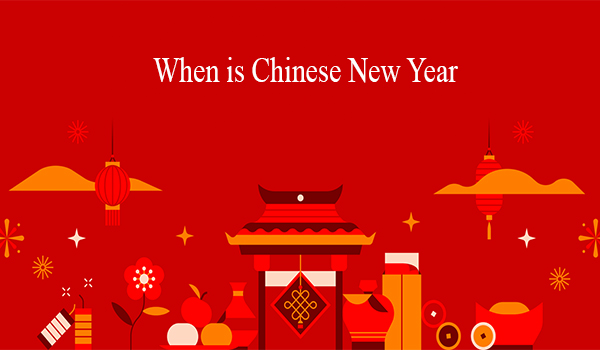Have you ever wondered When is Chinese New Year? Unlike the global New Year festive celebrated on January 1st, the Chinese year isn’t on that set date.

The dates vary in step with the Chinese calendar but generally fall daily on January 22nd within the Gregorian calendar. Hence, the Chinese new year falls on January 22nd and new year’s eve falls on the 21st of that same month.
How long is that festival? Most China citizens have a minimum of seven days off work, including three days’ holiday. And also the preceding and following weekends.
When is Chinese New Year
Chinese New Year, also called Spring Festival or Lunar twelvemonth, is the grandest festival in China. with a 7-day long holiday. Because of the most colourful annual event, the normal CNY celebration lasts longer, up to 2 weeks. And also, the climax arrives around the Lunar January 1st Eve.
When is Chinese New Year 2023
Next year’s Chinese New Year, will be held on January 22nd. This is on a Sunday, and there will be a holiday for 16 days as the celebration goes on.
China during this period is full of citizens with iconic red lanterns, loud fireworks, massive banquets, and parades. And therefore, the festival even triggers exuberant celebrations across the world.
2023 – The Year of Rabbit
In 2023 festival falls on January 22rd which is the Year of the Rabbit and it features a 12-year cycle annually of the Chinese zodiac signs. People born within the Years of the Rabbit including 1915, 1927, 1939, 1951, 1963, 1975, 1987, 1999, 2011, and 2023 will experience their Year of Birth (Ben Ming Nian).
Why is it Called Spring Festival?
The festival date is in January or February, around the Chinese solar term the ‘Beginning of Spring’, so it’s also named the ‘Spring Festival’.
How do Chinese People Celebrate the Festival? – Customs & Activities
When all households and yards are decorated with vibrant red lanterns and colourful lights, then the Lunar New Year is approaching. After a busy time with a house spring-clean and holiday shopping during half the month, the festive period is close.
And last 15 days, until the total moon arrives with the Lantern Festival.
Time for Family Reunion
Like Christmas in Western countries, Chinese New Year may be a time to be home with family, chatting, drinking, cooking, and enjoying a hearty meal together.
House Cleaning and Decorating – Half Month Before
No matter whether in a city apartment or a countryside villa, there must be a diligent housewife exerting all her energies to hold out a radical cleaning of the house before the Chinese year.
Sometimes the entire family must provide a hand with the chores, to form sure the home is eliminating the old year’s dust and is ready for taking within the fortune of the year.
Then every home is decorated with the foremost favoured colour, the intense Red – red lanterns, Chinese knots, Spring Festival couplets, ‘Fu’ character pictures, and red window paper-cuts.
Family Reunion Dinner – National Holiday Eve
Home is the principal focus of the Spring Festival. All Chinese people manage to create their way home most recently by New Year’s Eve, for a reunion dinner with the full family.
The essential course on all Chinese menus for a reunion dinner is steamed or braised whole fish, representing a surplus per annum. Various styles of meat, vegetable, and seafood are made into dishes with auspicious meanings.
Dumplings are indispensable for northerners, while rice cakes are for southerners. The night is spent enjoying this feast together with cheerful family talk and laughter. Read more about Chinese year Foods.
What to Eat – Priority of the Festival
In China, an old saying goes ‘Food is the first important thing for people’ while a contemporary saying ‘3 pounds’ weight gain at every festival.’ Both show the Chinese people’s love of food.
There probably aren’t any people quite just like the Chinese who are so passionate and fastidious about cooking. Besides basic requirements of appearance, smell, and taste, they impose creating festival foods bearing auspicious meanings and producing good luck. Check here for more https://chinesenewyear.net/
CHECK THIS OUT:
- Supplemental Nutrition Assistance Program – Applying for SNAP Benefits | SNAP Allotment
- WIC Eligibility – WIC Waiting List | Eligibility Requirements
- Supplemental Nutrition Assistance Program – Applying for SNAP Benefits | SNAP Allotment
- Chromecast Setup: A Quick Start Guide on How to Setup Google Chromecast



